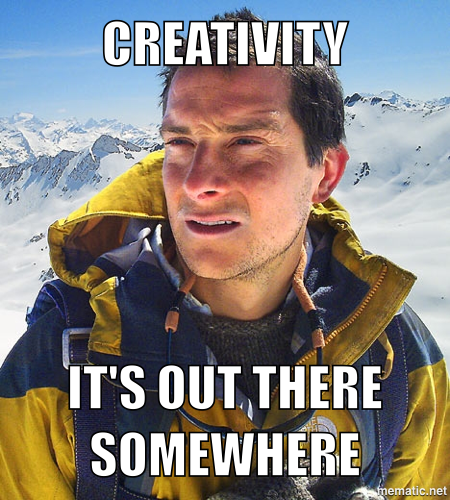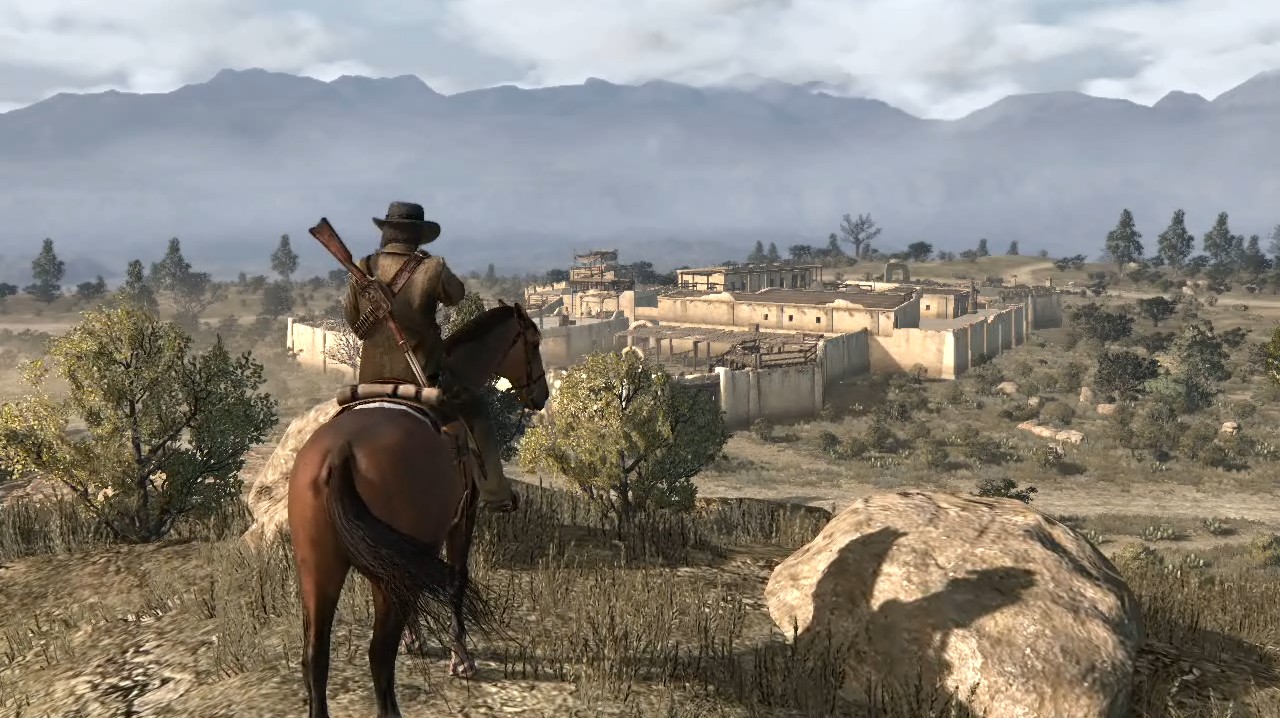Trending
Opinion: How will Project 2025 impact game developers?
The Heritage Foundation's manifesto for the possible next administration could do great harm to many, including large portions of the game development community.

Featured Blog | This community-written post highlights the best of what the game industry has to offer. Read more like it on the Game Developer Blogs or learn how to Submit Your Own Blog Post
Some thoughts about who the God, the Creator, the Mighty Author of a game is, and their relationship with the Playable Character or the player. Possible hints about creation, interactivity and storytelling in games.

I have worked for several game companies, with very, very, very different philosophies. I also enjoy playing many games. As a writer, I have done some work for different medias.
The more I talk to people, the more I wonder:
God, where are you?
Nah, 'kidding.
But something not so far from that:
Who is the auThor of a game?

Oops, wrong caps – yes this joke is completely lame – whatever. You may think this is a shitty question from an aspirant Author who is trying to be smart. Nah, I am not – smart – and I am not an Author either. But as the industry is growing, and growing, like a beautifully ugly monster... Well, asking if there is an author somewhere and who he might be, it is just asking if in this big mess, there are some guys, with some visions, with some greater expectations... or not.

God only knows
Let us be simple and short: an author is someone who makes choices to defend a vision.
I will not tell you who is the author for now, because I am a good writer and I know that teasing your audience is very important.
I will also mainly focus on storytelling... because it is part of my job and it is quite fancy these days. Hehe.
So let us start with what a "creator", an author, can do.
In any other media, storytellers have to choose which character(s) we will follow, which character(s) will lead the story and interact with the world they created. Once they have chosen, they define a specific charaterization that serve their purpose and voilà ! They are Mighty Gods who have full control of their universes.
In a game, it cannot be the same. First of all, an "author" have 2 choices:
being the Mighty God of an universe, by designing a specific path for the player, which is embodied by a specific character... because the Author is the Author – with a very big f*** A... ffirmative

not being the Author but the Creator of the game – with a big but nice curved C, like a hug, or legs or... well, whatever – who lets the players use their free will as much as they can. The Creator lets them shape their own story, their own character and their own "message", or meaning, among chaos! The players are the real Authors. The Creator is only here to give them some tools to make it happen. It is the "maieutics" choice.

Any "in-between" will be hard to handle, and often disappointing for the player.
But authors/creators/whatevers often look for something "in-between", especially when they want to tell a story.
For example, "open world" games usually have a main linear story and subquests. So the writer is the Mighty God of the main plot, but random and/or independant subquests can generate some chaos in the game. The players can choose between a linear path if they want a story-driven path, or design their own path/story through subquests.

But the problem is that usually you cannot play both options without feeling frustrated at some point: main quests and subquests are often contradictory. If they are somehow linked, NPCs create awkward dialogues which disrupt the famous "suspension of disbelief" we are looking for in stories. Because they have no brain – no real memory.

If subquests and main quest are not connected enough, you often lose interest for one of them... In the end, as players, we are usually torn between two paths: the one with no freedom but the promise of a good and well-written life – in the best case scenario – or the one with more freedom, but no grandeur, no main focus, no grand scheme, only small shitty objectives.
(Story of our lives, maybe.)
Moreover, there are often ways to force the player to play the main story – by gameplay – because the main story probably cost a lot and the Authors do not want you to miss that. In a game universe, the main plot is like the History of it, and the subquests are the gossips.
Indeed, everyone prefers gossips; but making some sense between them is almost impossible.
But how can you create a chaos that could make sense in the end for the player, without designing any specific path in it?
Let us see about the "maieutic choice". Used in God-like games.

With a Tamagotchi, as a player, you are interacting with a little creature that expects things from you. You, the player, have to feed it, to raise it, to teach it some tricks. The way it evolves depends on you, and only you. There is no real "intermediate" between you and the character (the NPC) in the game. There is no real "playable character". You are not pretending to be someone else. You are the player, and you play a game. End of story?
This is also what we can see in games... where you control every aspect of a civilization, an army, a city, a whole world or, let us say, a theme park.

(Such a good game) All the non-playable characters are talking to you directly, and you have a full control over your world. As a player, your part in it is to be... God. The Author! The world is defined by your game actions and decisions in a specific setting.
Thus, players are facing a system designed by a Creator... and create their own story in it. Not a "conventional" story though. But building something, protecting it, facing obstacles – enemies, lack of resources etc. – without being sure that you are going to win in the end... Is it not a story after all?
But can we let the players have a god-like power AND deliver them a good story at the same time? The big problem is: you mostly tell a story by actions/decisions made by a character. In a game, actions/decisions are ment to be fulfilled by the players. So players have to make the story happen somehow. How?
Who's telling? Who's seeing?
If an Author can be a Mighty God or just a Creator, what about the player? Can he be the Creator? A Mighty God? An Author? Or is he just an actor? These questions lead us to the point of view aspect. Normally, a point of view determines the whole structure of a narration. It also has a certain meaning: as a reader/a viewer, being omniscient is not the same as being in someone's head or a spectator. In the end, you do not live the same story at all.
In games, it is quite rare that point of view, or as we say, "focalization" should have a real impact on the story.

Games usually rely on cutscenes to tell good stories... Focalization is usually something that matters for gameplay; not for the story.
Authors of games have to choose the focalization carefully... especially when they want to tell a story. Today, when you play a game with a branching storyline... There are two things that may disrupt your experience:
you do not know what the consequences of your choice will be: you are not omniscient
AND
you cannot identify with the character: you usually do not know who he really is and what he would have chosen. It is not his point of view either.
You often do not have enough information regarding the whole plot or the character itself to make choices that really matter.


It seems that in many games, sometimes you are the "director" of a movie but without knowing what movie you are shooting; sometimes you are an "actor" who does not know his lines and has to pick up dialogues at certain points. The whole game just switches between these 2 roles.
With branching stories, games often try to let the player live one question: "If I were him/her, what would I do?" But this question is quite biased and way more complicated than it appears to be. Especially the "if I were him/her" part of the question: can you really be him/her? In any other story, you are driven by a story, by a character... In games, the player is the driver.
Finally, as a writer/author/whatever, when you tell a story, you want to surprise your audience. But you cannot do that if you give too much information to the player. Why? Because knowledge is power. It is even too powerful. It can create chaos!
But can you play a game without knowing all the rules of it?
What is the meaning of all this?
Nowadays, when you ask if there is any author in a game, people think the question is related to stories in video games (if a game needs a story or not). The usual fights gameplay VS story, mechanics VS emotions, art VS industry and yeah... yeah... whatever.
I am (kind of) a writer but I think a game does not need to tell a story to be a good game. That does not mean there is no storytelling or, as we say, a real narration in any game. As in movies: all movies does not need a script to be movies. The narration and the Author questions are not related to any story matters. Not exactly.
In fact, about the famous Gameplay VS Story combat, IMHO, the easiest way to think of it is: gameplay can create emotions in a game; story can give a meaning to them. They do not have to fight each other!

In a movie, editing generates emotions, it is its unique core language, something that no other media can achieve; still, you can choose to combine editing with a story or not. In literature: with words, with your writing style, you can tell a story... or not. (I love poetry.)
But, if we need to think about stories in games... Story can be part of the gameplay. For example, if branching dialogues are a main feature of a game, dialogues should be gameplay actions. Nothing more, nothing less. We could think about how the player can use timing, speed... They need a designed system, linked to all the other features of the gameplay.
Can you imagine a shooter with a gameplay like: choose between hitting the head, the torso or the foot - just pick up some answer and see what happens? Without letting you choose when, where and how you will do it? Without being challenged, without using most of your skills? (My bad, that is what QTE is all about...)
A good dialogue is about timing; about pace; about speed; about the range of your words, the tone of your voice, the way your body acts. You can attack or defend yourself. You can play it smooth, stealth, sneaky, you can fight with your words like a warrior. What you say is as much important as when and where and how you say it.
Gameplay can also be thought of as a very special way to tell a story. But in this case, every gameplay aspect should be thought of as... narrative elements. Does it make any sense to have a character who wants to be the good guy for his family, to be responsible, but can kill people randomly, without any consequences?

Of course story can give a certain meaning to a gameplay... but any gameplay has its own meaning in itself. Because game design is about rules: what a player can do to win or to lose, and what he can win or lose. Those mechanics could be way more powerful than the simple: more points I win, less points I lose. In a world like ours, there is so much more to tell about those questions. I think that anyone who wants to be the Author of a game has to think carefully about these questions: what do I want my player to win? And what will he do to achieve it? Not only in terms of systems, but also in terms of meaning. (And if you want to be a Creator, you may let the player choose what he really wants to win and how.)
So who is the author of a game?
Someone who makes choices to defend a vision in a game.
I use the singular on purpose: it is one vision, even if it is a collaborative work. (Do not make me argue on that, it has been debated for ages already, for movies, TV shows etc.)
And any player can be one of the authors of a game, if wisely guided by a creative creator.
End of story?
To see further:

Are we ready for shorter game experience?
Empathy in Game Design, or Why Some People Like Beyond: Two Souls
Read more about:
Featured BlogsYou May Also Like